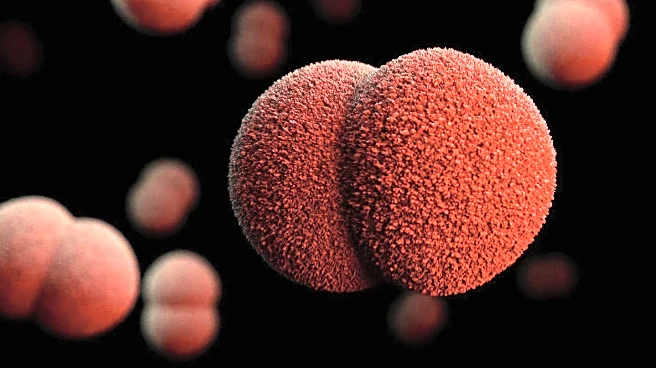What's Happening?
Recent research conducted by Dr. Wei-Hua Huang from Wuhan University and Dr. Christian Amatore from Xiamen University has unveiled the critical role of lysosomal acidity in regulating the production of reactive oxygen species (ROS) and reactive nitrogen species (RNS) within macrophages. These findings, published in the journal Research, highlight how lysosomal pH acts as a chemical dial, influencing the balance between different reactive species during phagocytosis. Acidic conditions within lysosomes favor the production of hydrogen peroxide, while mild alkalinization promotes the formation of nitric oxide, peroxynitrite, and nitrite. This precise pH-dependent control shapes immune responses, oxidative stress, and inflammatory signaling, offering insights for therapies targeting macrophage function.
Why It's Important?
The study's findings have significant implications for understanding immune regulation and developing therapeutic strategies. By elucidating the role of lysosomal pH in controlling ROS and RNS production, researchers can better understand how macrophages balance microbial killing with self-protection. This knowledge could lead to targeted therapies for conditions involving dysregulated lysosomal pH, such as chronic inflammation, autoimmune disorders, and impaired microbial clearance. Modulating lysosomal acidity may enhance pathogen clearance in immunocompromised individuals or reduce oxidative stress in autoimmune diseases, offering potential benefits for public health and medical treatment.
What's Next?
The research opens avenues for further exploration into the therapeutic modulation of lysosomal pH. Future studies may focus on developing methods to stabilize lysosomal acidity in specific patient populations, potentially improving immune responses and reducing inflammation. Additionally, the use of nanoelectrochemical sensors in this study sets a precedent for more precise investigations into cellular processes, which could lead to advancements in understanding and manipulating immune functions at the molecular level.
Beyond the Headlines
The study highlights the active role of lysosomes as chemical modulators rather than passive containers, emphasizing their importance in immune signaling. The nuanced regulation of reactive species within lysosomes allows macrophages to tailor their microbicidal arsenal to specific threats, an adaptive feature that enhances immune efficiency. This research underscores the complexity of immune responses and the potential for innovative approaches to disease treatment through cellular manipulation.












